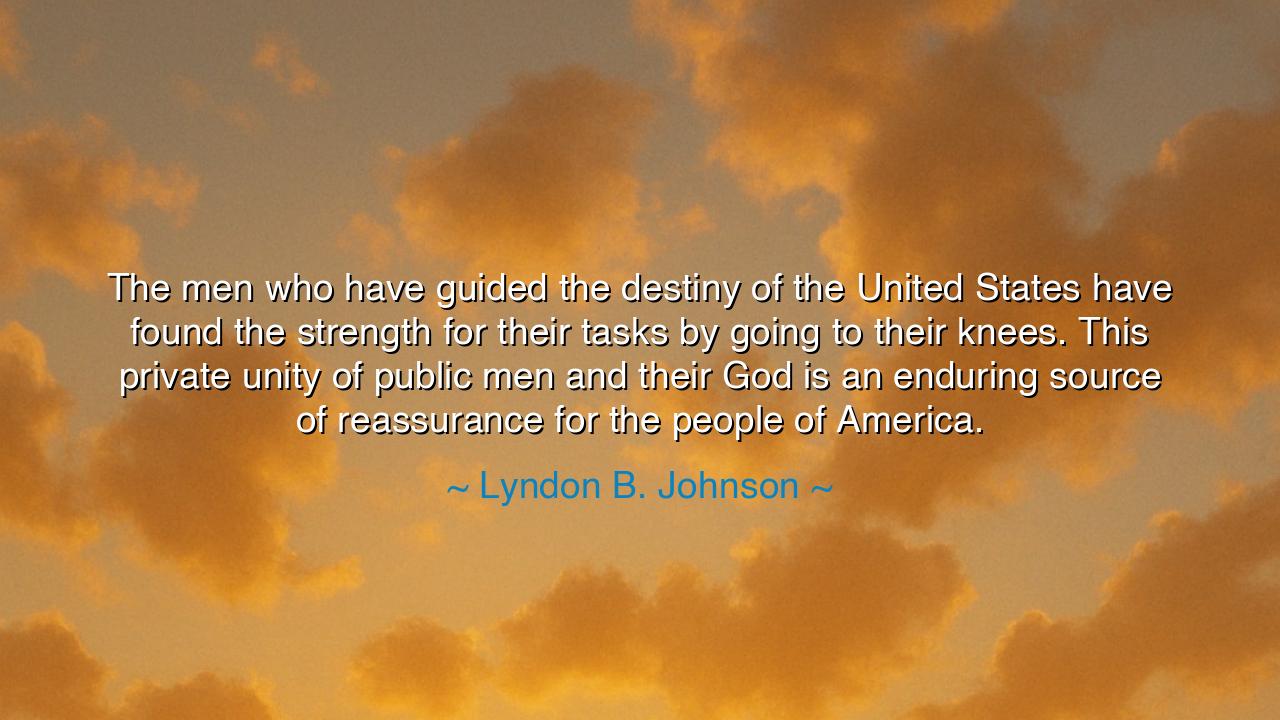
The men who have guided the destiny of the United States have
The men who have guided the destiny of the United States have found the strength for their tasks by going to their knees. This private unity of public men and their God is an enduring source of reassurance for the people of America.






Lyndon B. Johnson, in the midst of his burdens as president, spoke these words of gravity and reverence: “The men who have guided the destiny of the United States have found the strength for their tasks by going to their knees. This private unity of public men and their God is an enduring source of reassurance for the people of America.” In these lines, he reveals that the foundations of leadership are not built only upon intellect, power, or policy, but upon prayer, humility, and the unseen bond between man and the Divine.
The meaning is clear: true strength does not rise from pride, but from kneeling. When leaders bend their knees, they confess that human wisdom alone cannot bear the weight of nations. They seek guidance beyond themselves, asking for light where there is darkness, for courage where there is fear, for mercy where there is wrath. To kneel is not weakness, but the greatest act of strength — for it is the recognition that man is but dust without the breath of God, and that destiny itself is steered by hands greater than his own.
The origin of this truth runs deep in the American story. George Washington, commander of the Continental Army, was seen kneeling in the snows of Valley Forge, praying for endurance when his army was starving and his cause seemed lost. Abraham Lincoln, weary with the anguish of civil war, confessed that he often went to his knees, knowing he had nowhere else to go. These men, great in stature yet humble in spirit, drew their strength not only from strategy and courage, but from communion with God. Johnson’s words echo their legacy: that private devotion gives public men the endurance to carry the burdens of a people.
Consider the story of Franklin D. Roosevelt, who in the dark days of the Great Depression and the storms of the Second World War turned often to prayer. His fireside chats lifted the hearts of millions, but his private moments of supplication lifted his own. When he prayed publicly on D-Day, asking God to protect the sons of America crossing the seas into battle, the nation found reassurance not only in his leadership but in his humility. The people saw that their leader sought guidance beyond himself, and this gave them courage to endure.
The teaching is timeless: leadership without humility leads to tyranny, but leadership rooted in prayer leads to hope. A ruler who kneels before God need not kneel before men, for he carries within himself the assurance of divine guidance. And a people who know their leaders seek wisdom from above find themselves steadied, reassured that the burdens of their destiny are borne not by one man alone, but by a union of man and heaven.
This lesson is not for leaders alone. Each life, whether great or small in the eyes of the world, carries its own heavy tasks. Parents guiding their families, teachers shaping the young, workers laboring in duty — all need strength beyond themselves. The act of kneeling, whether in prayer, meditation, or silent humility, is the wellspring of endurance. By seeking wisdom beyond the self, the individual finds clarity, patience, and peace to walk forward.
Therefore, my children, let this be your guiding truth: do not trust only in your own strength. When the burden is heavy, bend your knees. When the path is dark, seek the light beyond yourself. When destiny calls, unite your private soul with the Eternal, for from this unity flows the strength to face every trial. And know this also: a people whose leaders kneel in humility shall not be easily shaken, for their nation rests not on pride alone, but on the unbreakable foundation of faith.






AAdministratorAdministrator
Welcome, honored guests. Please leave a comment, we will respond soon